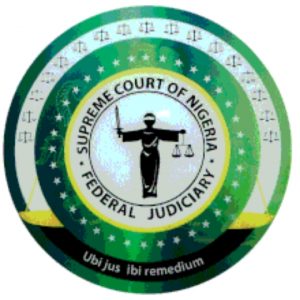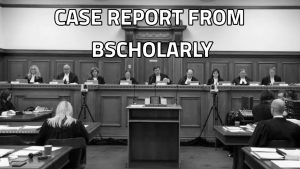Peter Obi v INEC: The Constitution makes provision for Government officers. It makes provisions for qualifications, conduct of elections and the body where disputes with regards to these elections can be resolved.
The Constitution also makes provisions for the number of years in which a person can hold an office. This number of years is what is known as tenure. Where this tenure has not elapsed, a new officer cannot be elected, unless the old one has been impeached.
In the case of Peter Obi v INEC, the court determined when tenure commences and when it ends, pursuant to the provisions of the Constitution. It also ruled on the powers of the body responsible for the conduct of elections and the limit of the powers of the body.

Also see: How to become a successful lawyer
Fact summary of Peter Obi v INEC
Peter Obi, the appellant, and Governor of Anambra State, brought an action, contending that his tenure in office was to start on the day he took his oath of allegiance and oath of office. That is, the day he was sworn into office. This was on the 17th of March 2006. Hence, there ought not to be another Governorship election on the 14tth of April 2007. This is because, by virtue of the provisions of Section 180(2)(a) of the Constitution of the Federal Republic of Nigeria, tenure for the office of Governor was four years and an allowance of two terms where the candidate wins the election again.
Prior to this time, the appellant had claimed that the declaration made in the 2003 election was wrongly made, as Dr. Chris Ngige was declared the winner of the 2003 Governorship election when the appellant had won majority votes.
The Election Petition Tribunal set aside the declaration that Dr. Chris Ngige was the winner of the 2003 election and declared the appellant the winner of that election.
When the 1st respondent, the Independent National Electoral Commission (INEC), attempted to run another election on the 14th of April, the appellant felt threatened as he had not completed his four year tenure.
He brought a suit to the Federal High Court, the Court of Appeal, and later on, the Supreme Court.

Recommended: Facts, Issues and Judgment of Court In Mojekwu v Mojekwu
Issues Determined in Peter Obi v INEC
a. When the term of office of a Governorship candidate starts
b. The effect of a decline of jurisdiction by the court
c. Whether or not the Federal High Court has jurisdiction to entertain the suit
Also see: Exceptions to the principle of delegatus non potest delegare in law
Decision of the court in Peter Obi v Independent National Electoral Commission (INEC)
The case was first brought to the Federal High Court where the Court held that it has no jurisdiction to entertain the matter because it was an election matter, and should thus be heard in an Election Tribunal.
The case was, therefore, struck out.

The appellant appealed to the Court of Appeal. The Court of Appeal, like the court below, declined jurisdiction to hear the matter, also stating that it was an election matter and ought to be treated by the Election Tribunal.
The appellant then appealed to the Supreme Court and judgment was given in his favour. The Supreme Court allowed the appeal unanimously.
The Supreme Court held that the court could not make another declaration after declining jurisdiction. It held that the only declaration that the court ought to be making after declining jurisdiction was that of striking off the case. Any order made after a decline of jurisdiction was invalid. This was the effect of a lack of jurisdiction.
The Court held that what determines jurisdiction was the claim made by the party suing. It stated that, in the instant case, what gave the appellant a cause of action and a claim was the intention of the respondent to set up an election.
The Court pointed out that the instant suit was simply to get a legal pronouncement or declaration of when his tenure would end.
The Court held that pursuant to Section 251(q) and (r) of the 1999 Constitution of the Federal Republic of Nigeria (as amended), the Federal High Court was vested with the power to interpret provisions of the Constitution as it relates to the Federal Government and its agencies.
The provisions of Section 285(1)(2) of the Constitution of the Federal Republic of Nigeria gave exclusive jurisdiction to the Election Petition Tribunal to decide on an issue where an election had been held. However, the instant case is one that deals with an issue that predates the election. The appellant was simply seeking a declaration from the Federal High Court on the tenure of his office. Thus, the Federal High Court was simply to interpret the provisions of the Constitution, as was within its powers to do.
It pointed out that the Court of Appeal had the opportunity to invoke the provisions of Section 16 of the Court of Appeal Act which provides that the Court of Appeal can make an order not made in the lower court where this is in the interest of justice and where reverting such case to the lower court would cause injustice. This, the Court of Appeal failed to do.
It therefore, pointed out that Section 22 of the Supreme Court Act allowed the Supreme Court to do all things that would bring about justice.
It held that the issue of tenure of office was not an Electoral matter and that of the Governorship candidate is provided in Section 180 of the Constitution. Also, nothing in the Constitution provided that all the elections done in the country must be done at the same time.
The court described INEC’s act of conducting an election while the seat of the Governor was not vacant, as wasteful and unnecessary. It stated that INEC showed a disrespect for rule of law by proceeding with the election even when it knew that the appellant was in Court fighting to enforce his legal right.
It made a declaration that the tenure of office of the appellant had begun on the day he was sworn into office, which was the 17th day of March 2006 and would expire on the 17th day of March 2010, being a four years tenure, as is provided by the Constitution.
It, thus, made an order that the 5th respondent vacates the office of the Governor immediately.
It stated that when interpreting the provisions of the Constitution, related provisions must be read together and that words must be given their ordinary grammatical meanings unless that leads to a result that could not have been the intention of the law maker.
It stated that the principle of lis pendis demanded that a party to a pending suit refrains from doing an act that will defeat the judgement of the court.
Finally, the court stated that a declaratory judgement is a discretionary judgement, but that it was one which the court gave when it was satisfied that the party seeking it was entitled to having the court exercise such a discretion to favour him.
Recommended: Advantages and Disadvantages of a written constitution
Conclusively, the issue of tenure of office is one that is Constitutionally provided for. Thus, even the Independent National Electoral Commission, responsible for the conduct of elections cannot violate the provisions of the Constitution. Where this tenure has not elapsed, nor has the person filling the office in question, been impeached, INEC will have to uphold the provision of the Constitution.

Edeh Samuel Chukwuemeka, ACMC, is a lawyer and a certified mediator/conciliator in Nigeria. He is also a developer with knowledge in various programming languages. Samuel is determined to leverage his skills in technology, SEO, and legal practice to revolutionize the legal profession worldwide by creating web and mobile applications that simplify legal research. Sam is also passionate about educating and providing valuable information to people.